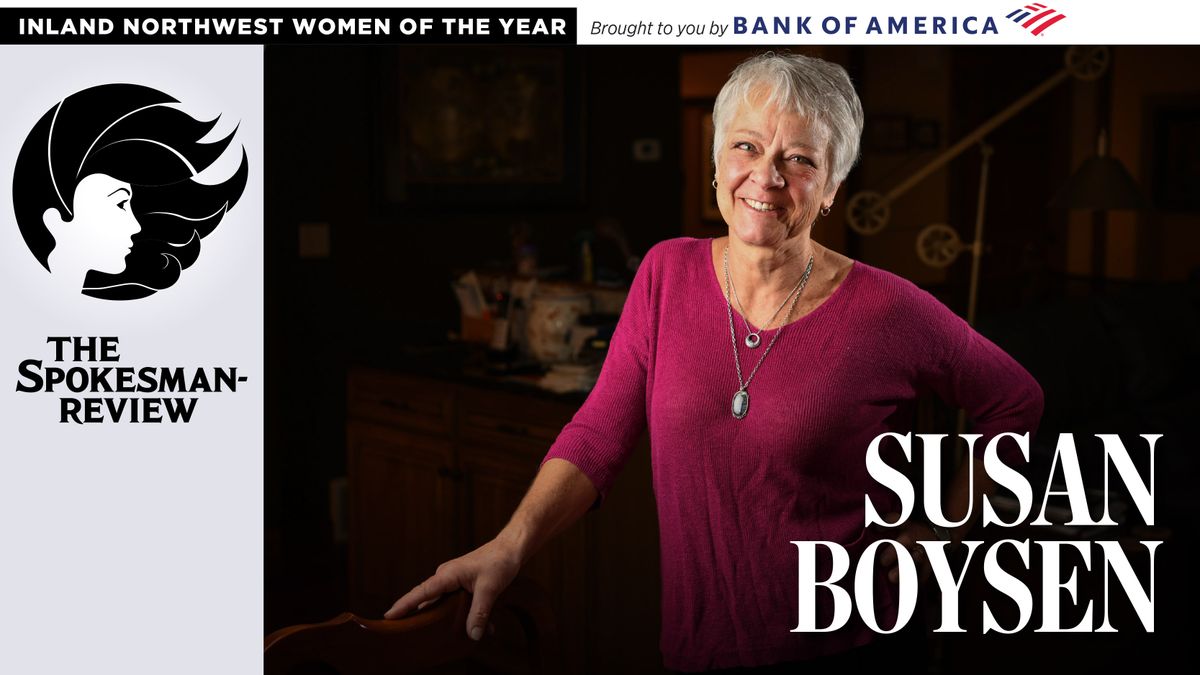Gonzaga University nursing professor’s contributions extend far past Spokane

Susan Boysen fell into nursing education by accident.
After working as a nurse practitioner in Spokane, she needed to change jobs but could not find any full-time nurse practitioner jobs. She took a job teaching at Washington State University, eventually moving over to Gonzaga University.
Now, after 30 years of teaching at Gonzaga, her contributions to the nursing education community extend far past Spokane.
“She really truly is a remarkable nurse and a remarkable nurse educator,” Gonzaga nursing professor Jane Tiedt said. Tiedt has worked with Boysen during her master’s program at Gonzaga and now as her colleague in teaching.
Boysen has spent her career researching, writing textbooks, traveling the area and the world to educate others on community health and prevention. She helped develop curriculum for Gonzaga’s nursing program. She served on the Spokane Regional Board of Health. She’s consulted numerous organizations in the area on their community health needs.
After she started teaching , Boysen, who grew up in Spokane, knew that teaching was what she wanted to do.
Her passion is community health nursing, which focuses on the health of a group or community rather than the individual. Community health nurses may work with an entire school district or within transitional housing or with the local health district.
Some students, she said, don’t ever see themselves working in community health nursing but rather focus on nursing in hospitals.
“It’s the farthest thing they would end up doing,” Boysen said.
But then in Boysen’s classes, they learn how to engage with communities in different ways and how much of a difference they can make. Then, “the light bulb goes on.”
“I love it when that happens,” she said.
Over her career, Boysen has educated thousands of nurses in Spokane and the Pacific Northwest, Tiedt said.
She was instrumental in developing Gonzaga’s nursing program, Tiedt said, adding Boysen is amazing with curriculum and helping teachers develop their courses.
Boysen is quick to recognize all her colleagues at Gonzaga for helping to create such a good program.
But she’s not easy on her students, Tiedt said. She’s tough, but that’s what pushes them to grow. To Tiedt, Boysen has always been a mentor to her. When she was writing her master’s thesis, Tiedt said she would always go to Boysen with questions.
Boysen was everybody’s “go-to person” for questions, Tiedt said.
“She just knew the research inside and out,” Tiedt said. “She was just a whizz at it.”
Boysen’s husband, Dick, said he’s had her students as his own nurses. They always tell him how much they appreciated her teaching, Dick Boysen said.
“They’ll say, ‘Of all my professors at Gonzaga University, Susan was by far the best,’ ” he said.
She’s beloved all over the university, he said.
Boysen often coordinated the community health clinics for Gonzaga students. She would find organizations in the community that would need a partner in health promotion.
Dick Boysen said she was instrumental in developing relationships with local organizations in the area and placing students there to help with their community health needs.
Dick Boysen used to be the executive director at Joya Child and Family Development. He and Susan Boysen met when she had placed some students to help out at Joya and did some pro bono community health work.
Tiedt pointed to Boysen’s work with the homeless population in Spokane, offering weekly clinics, foot care and wound care, with her students. Boysen often donates free supplies to the clinic, bringing in toiletries or handmade mittens or socks.
During every meeting, Boysen is knitting, Tiedt said. Then, right before Christmas, she opens her office and sells everything she’s made throughout the year. The money she makes goes to fund her project in the West African nation of Benin, which provides water filtration and education to local communities.
“She’s very humble but has the biggest heart,” Tiedt said.
She worked in Benin and Zambia for a number of years, leading a study abroad program and helping to teach the local population about water health issues and health promotion.
She learned how to be creative in her teachings, as most people who lived there only spoke French. She often used skits, posters and drawings. Teaching isn’t always standing in front of a classroom talking to people, she said.
“It really just reinforced to me the importance of community health and prevention,” Boysen said.
Boysen officially retired from Gonzaga in May. She said she plans to spend more time caring for her parents, who are both in their 90s. She and her husband also hope to take a few road trips across the country. She’s also excited to continue knitting and crafting. She is currently teaching herself to weave.
Even though she retired, however, she still helps supervise one clinical once a week. She knows the department is always looking for more supervisors for those clinical experiences, and she knows she could help.
“And I just like doing it,” she said.